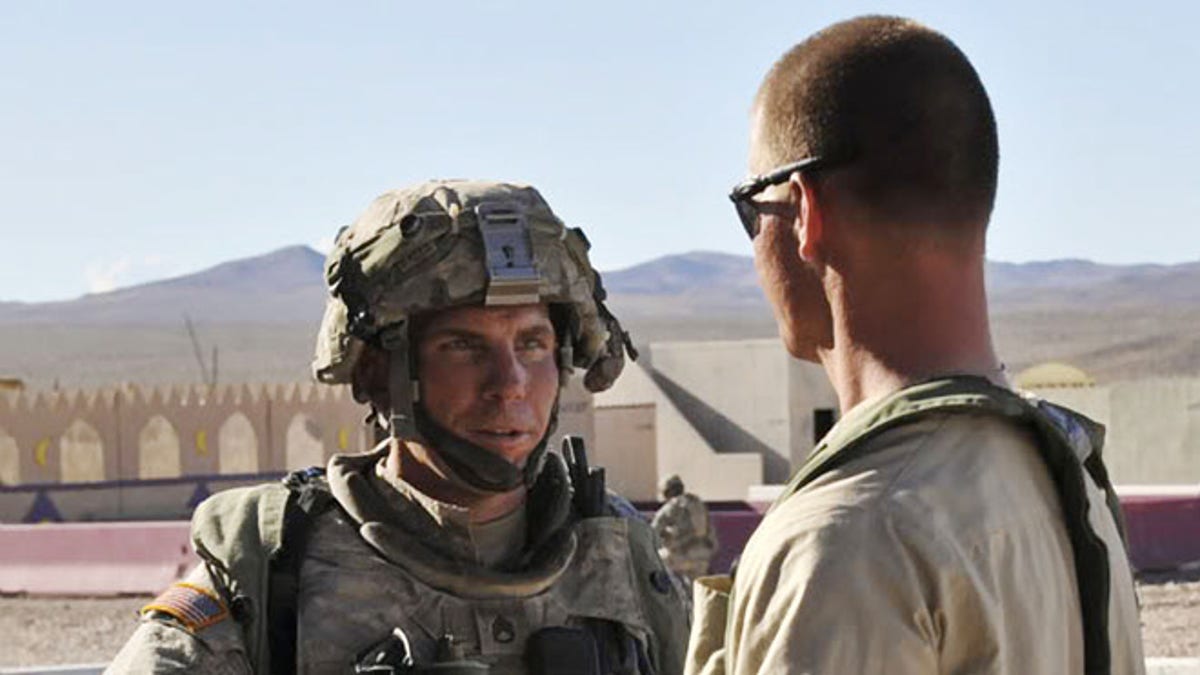
Aug. 23, 2011: In this file photo, Staff Sgt. Robert Bales, left, 1st platoon sergeant, Blackhorse Company, 2nd Battalion, 3rd Infantry Regiment, 3rd Stryker Brigade Combat Team, 2nd Infantry Division participates in an exercise at the National Training Center at Fort Irwin, Calif. (AP)
JOINT BASE LEWIS-McCHORD, Washington – Two victims and four relatives of victims are scheduled to testify from Afghanistan on Friday night against the American soldier accused of devastating their remote villages during a nighttime massacre last March.
The villagers will speak, by video conference and through an interpreter, to a military courtroom at Joint Base Lewis-McChord during an overnight session to accommodate the time difference. They are expected to describe the horrors that befell them before dawn on March 11.
Staff Sgt. Robert Bales, a 39-year-old father of two, could face the death penalty if he is convicted of 16 counts of premeditated murder and six counts of attempted murder in the attack in southern Afghanistan. The preliminary hearing in his case, which began Monday, will help an investigating officer determine whether to recommend a court-martial.
Prosecutors say that Bales wore a T-shirt, cape and night-vision goggles -- no body armor -- when he slipped away from his remote post, Camp Belambay. He first attacked one village, returned to the base, and headed out again to attack another village, they say.
In between, he woke a fellow soldier, reported what he'd done, and said he was headed out to kill more, the soldier testified. But the soldier didn't believe what Bales said, and went back to sleep.
Nine children were among the victims, and 11 of the victims were from the same family.
Two Afghan National Army guards who reported seeing a soldier return to Belambay and then leave again were also scheduled to testify Friday night.
On Thursday, a U.S. Army DNA expert testified that Bales had the blood of at least four people on his clothes and guns when he surrendered.
The blood of two males and two females was discovered on Bales' pants, shirt, gloves, rifle and other items, said Christine Trapolsi, an examiner at the Army's Criminal Investigation Laboratory.
To preserve the evidence, she said she only tested a portion of the bloodstains, and it's possible more DNA profiles could be discovered through additional testing.
Another forensic expert from the Criminal Investigation Lab, fiber specialist Larry Peterson, testified that a small piece of fabric that matched the cape Bales reportedly wore was discovered on a pillow in one of the attacked compounds.
Prosecutors referred to the cape as a blanket, but Peterson said it was more like a decorative covering for a window or doorway.
Bales has not entered a plea and was not expected to testify. His attorneys, who did not give an opening statement, have not discussed the evidence, but say Bales has post-traumatic stress disorder and suffered a concussive head injury during a prior deployment to Iraq.
A U.S. agent who investigated the massacre has testified that local villagers were so angered it was weeks before American forces could visit the crime scenes less than a mile from a remote base.
By that time, bodies had been buried and some bloodstains had been scraped from the walls, said Special Agent Matthew Hoffman of the Army's Criminal Investigation Command.
Other stains remained, on walls and floors. Investigators recovered shell casings consistent with the weapons Bales reportedly carried.
Hoffman also said Bales tested positive for steroids three days after the killings.
Bales leaned back in his chair at the defense table and did not react as an Army doctor, Maj. Travis Hawks, gave clinical descriptions of treating the wounded villagers as they arrived at a nearby forward operating base.
One girl had a large bullet wound in the top of her head, he said. She was unresponsive at first, but survived after treatment.
A woman had wounds to her chest and genitals, but she and her relatives insisted that the male doctors not treat her. Prosecutors showed photos of the victims being treated.





















